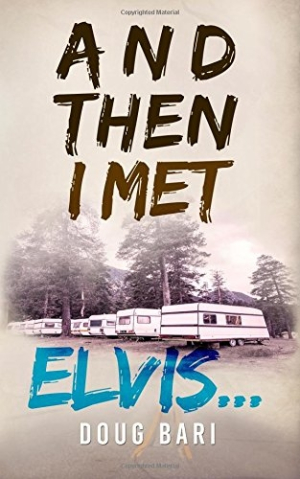
And Then I Met Elvis…
The sense of a stolen childhood lingers throughout this coming-of-age novel about growing up with an alcoholic parent.
In Doug Bari’s raw coming-of-age novel And Then I Met Elvis, a teenager’s life is impacted by his hard-drinking mother.
In 1969, Tim and his mother live in a trailer park in Maine. A gang of bullies, led by Moosie, picks Tim as their prime target. Because his mother spends most of her time watching television in a haze, Tim has to fend off the bullies himself, not to mention find his own food and keep himself amused. The only real thing Tim enjoys is the music of the Beatles. Then Elvis arrives in the trailer park, and Tim finds in him a kindred spirit—and a bulwark large enough to keep Moosie and his gang at bay.
The early part of the book strains to establish Tim’s reality, and the litany of difficulties wears thin. Tim narrates in streams of expletives, most often hurled at his mother. His voice is uneven, its rough language improbably mixing with words like “faux” and “ensconced.” As he ages, his bad language is amplified by sexual slang, shoplifting replaces his paper route, and he steps close to physical violence toward his mother.
The story seldom moves beyond the trailer park and a few local stores, conveying the narrow borders of Tim’s life well. Adults are drawn in a sharp but stereotypical way, epitomizing dysfunction, including a young mother who hires Tim to babysit, sends waves of sexual heat his way, and throws him an objectionable birthday bash. The Vietnam veteran who runs the pizza shop is the most reliable adult in Tim’s life, but even their friendship is derailed.
The story’s easy pace is driven by episodes rather than growth or an overarching plot. Tim and Elvis react to adults and situations around them but seldom engage in actions of their own, and the story doesn’t end so much as fade away: characters leave, but do not grow. The last chapter jumps decades ahead and shows Tim revisiting the trailer park in his fifties, settled in life and love, but how he worked his way out is never explained. It’s a disjointed conclusion.
And Then I Met Elvis is a novel about the bitterness of growing up with an alcoholic parent, with a sense of childhood lost and never found that lingers.
Reviewed by
Susan Waggoner
Disclosure: This article is not an endorsement, but a review. The publisher of this book provided free copies of the book and paid a small fee to have their book reviewed by a professional reviewer. Foreword Reviews and Clarion Reviews make no guarantee that the publisher will receive a positive review. Foreword Magazine, Inc. is disclosing this in accordance with the Federal Trade Commission’s 16 CFR, Part 255.
